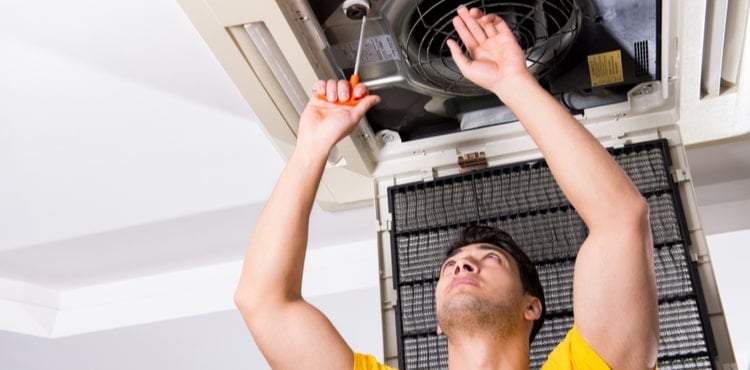HVAC contractor license requirements

HVAC professionals install, repair, and maintain heating and cooling systems in residential and commercial buildings. An HVAC contractor can work on anything from renovating and restoring residential HVAC systems to large construction projects.
Each state has its own licensing, bonding, and insurance requirements for HVAC technicians and contractors. Let’s look at the steps required to become an HVAC contractor, the education you’ll need, the types of licenses available, and what to do about insurance.
What are the requirements to become a HVAC contractor?
Your state’s specific requirements, licensing and regulations might differ from other states, but there are similarities. Before working on boilers or heating, ventilation, and air conditioning systems, also known as HVAC and HVACR, you’ll most likely need to:
- Prove your education
- Get a background check
- Pay the license application fee and the exam fee
- Pass a state license exam, as well as a business and law exam
For many states, proving your education involves technical school coursework on air conditioning and refrigeration systems or HVAC classes at a community college or trade school, followed by an apprenticeship to get on-the-job experience in the field.
After gaining enough work experience and passing a licensing exam with your state licensing board, you will then be able to work under your own supervision. You'll also be able to pursue a mechanical contractor license, master license or journeyman license to work as a journeyman HVAC contractor or master HVAC contractor.
Under the Refrigerant Recycling Rule in the Clean Air Act, the Environmental Protection Agency (EPA) also requires a Section 608 Technician Certification for those in the HVAC industry who maintain, service, or build systems that could release refrigerants into the atmosphere, such as air conditioning systems.
What kind of HVAC licensing and certification requirements are there?
While most states require an HVAC license to work on heating and cooling systems, licensing is not required in:
Even if your state board doesn’t require an HVAC license, you’ll still need to have EPA certification to work with coolants, which requires a one-time test.
You might also face contractor’s licensure requirements to bid on a job, or need to supply proof of HVAC certification to your local government, labor union, or trade group. Lastly, you may still need a business license to open an HVAC contracting business.
If your state does have a licensing requirement, this might seem inconvenient to you. However, this can sometimes be a benefit. A license can separate you from your peers without licensing credentials, giving you an edge. Also, your state may have a reciprocity agreement with neighboring states, allowing you to work across state lines without needing an additional license.
The education requirements for an HVAC license or certification usually include:
- 18 or older with a clear criminal record and no felonies
- A high school diploma or GED, or a bachelor’s degree for some higher-level licensing
- A record of classroom and on-the-job training with a recognized HVAC training program and working under a licensed HVAC contractor
Depending on your location, to maintain your license you may be required to take continuing education courses.
Let’s look at the HVAC licensing requirements for different states.

HVAC licensing requirements in Texas
Texas requires HVAC contractors to obtain a license from the Texas Department of Licensing & Regulation.
In Texas, you are required to have four years of practical experience within the past six years while working under the supervision of a licensed HVAC technician, or one year of technical school and three years of work experience.
You must then pass an HVAC licensing exam and have proof of HVAC business insurance to obtain a license.
There are two types of HVAC licenses available in Texas:
- Class A license: You can work on HVAC units of any size.
- Class B license: You can work on cooling systems that are less than 25 tons and heating systems of up to 1.5 million BTUs per hour.
Texas requires HVAC contractors to carry the following minimum amount of general liability insurance:
- Class A: $300,000 per occurrence and $600,000 aggregate
- Class B: $100,000 per occurrence and $200,000 aggregate
HVAC licensing requirements in Florida
Florida requires contractors to obtain an HVAC license from the Department of Business and Professional Regulation.
You must pass trade, business, and finance exams. You’ll also need to show proof of education and experience.
In Florida you must meet one of the following levels of education and experience requirements to obtain a license:
- A bachelor’s degree in HVAC engineering or a related field, and 2,000 hours (one year) of experience
- Four years of vocational training in an apprenticeship program, with at least one year as a foreman
- One year of experience as a foreman and at least three years of college
- One year of experience as a worker, one year as a foreman, and two years of college
- Two years of experience as a worker, one year as a foreman, and one year of college
There are four types of HVAC contractor licenses in Florida:
Class A license: You can install, maintain, and repair HVAC systems of any size.
Class B license: You can install, maintain, and repair HVAC units of 500,000 BTUs of heating and 25 tons of cooling, or less.
Class C license: You are limited to servicing HVAC systems, including duct work alterations. New Class C contractor licenses are no longer available, although those with existing Class C licenses can renew them.
Additionally, each license can be for either a Certified Air Conditioning Contractor or a Registered Air Conditioning Contractor. A certified license allows an HVAC contractor to work anywhere in the state. A registered license allows a technician to only work within designated local areas.
HVAC contractors in Florida must have $100,000 in public liability insurance, which is included in your general liability coverage. Contractors must also have $25,000 in property damage insurance. The state also requires workers’ comp insurance for all contractors in the building trades.
HVAC licensing requirements in Alabama
HVAC contractors in Alabama must be licensed by the Alabama Board of Heating, Air Conditioning & Refrigeration Contractors.
In addition to passing an HVAC licensing exam, the state requires an apprenticeship certificate issued by the Board for Contractors for the preceding two years, or transcripts that prove graduation from an approved HVAC education course. Alabama also requires at least 3,000 hours (18 months) of experience working under a licensed contractor.
All HVAC license holders must obtain a $15,000 performance bond.
What is NATE certification, and do I need it?
North American Technician Excellence (NATE) is the nation’s largest nonprofit certification organization for the HVAC industry. Contractors are advised to get at least 6 to 12 months of experience before registering with NATE, or two years of HVAC work experience before taking its professional-level tests.
NATE certification isn’t required to work on HVAC systems. However, many technicians pursue this as a way to demonstrate their knowledge and separate themselves from the competition, with the goal of securing more contracts.
What bonds and insurance coverage does an HVAC contractor need?
Each state has different requirements when it comes to insurance for HVAC contractors, including proof of insurance to obtain or renew a license. Additionally, if you get a license from your local government, it may have its own insurance requirements for HVAC contractors.
Even though each state has its own insurance coverage requirements, you’ll likely need the following insurance policies:
General liability insurance
General liability insurance provides financial protection against common business risks, such as customer injuries and customer property damage. It’s often required to sign commercial property leases and to qualify for contracts, especially when dealing with government entities.
Workers' compensation insurance
Most states require businesses with one or more employees to obtain workers’ compensation insurance, which covers employees’ medical costs and lost wages due to work-related illnesses and accidents.
Many states also require workers’ comp for those in the building trades, even for sole proprietors with no employees.
Contractor's tools and equipment
Many HVAC contractors and those in the building trades also buy contractor's tools and equipment insurance, which covers the repair or replacement of your tools and equipment if they’re lost, stolen, or damaged.

Commercial auto insurance
If your business owns a vehicle, most states require you to have commercial auto insurance, which covers your legal bills, medical expenses, and property damage if your work vehicle is in an accident.
Surety bond or performance bond
You may also have to secure a surety bond or performance bond to obtain your license or bid on contracts. They both can pay a client if you fail to deliver on a contract.
Business owner's policy (BOP)
A business owner’s policy (BOP) bundles general liability insurance with commercial property insurance, and typically costs less than if the policies were bought separately.
If your HVAC business rents or owns commercial property, BOP can protect your business space and equipment from damage or loss, as well as provide coverage for third-party injuries.
Cyber liability insurance
For HVAC businesses that handle client credit card information or work in the cloud, cyber insurance will cover any expenses from a cyberattack, such as customer notification, credit monitoring, and legal fees.
Because state laws regulate the investigation and reporting of data breaches for affected residents, it's important to know the notification requirements for your business location.
Get small business insurance quotes from trusted carriers with Insureon
Complete Insureon’s easy online application today to compare insurance quotes from top-rated U.S. carriers. You can also consult with an insurance agent on your business insurance needs. Once you find the right types of coverage for your small business, you can begin coverage in less than 24 hours.
Mike Mosser, Content Specialist
Mike spent several years as a reporter and editor covering politics, crime, and the world financial markets. He’s worked for several newspapers, a financial newswire, and a monthly magazine. As a copywriter, Mike has produced SEO-based content, marketing, public relations, and advertising work for a variety of companies.










